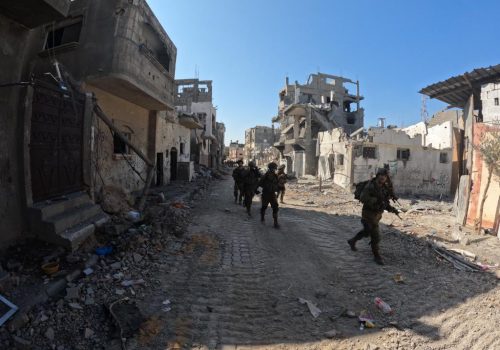Sanctioning the ICC over Israel is a strategic misstep for the US
In late May, the Joe Biden administration announced its opposition to sanctions that Republicans in Congress are promoting against International Criminal Court (ICC) officials in reaction to the ICC prosecutor’s decision to file applications for arrest warrants for Israeli Prime Minister Benjamin Netanyahu and Defense Minister Yoav Gallant concerning the Gaza war. Earlier this month, on June 4, the US House of Representatives passed a bill to impose sanctions against the ICC. While the US-ICC relationship is historically complicated, the possibility of sanctioning the court is strategically futile and undermines long-term US interest in an increasingly uncertain and multipolar world. The Biden administration should maintain its position.
The decision by the ICC’s Office of the Prosecutor (OTP) to seek arrest warrants against a head of state who enjoys support from the West is unprecedented. While the United States has never been a member of the ICC, it participated in the negotiations that led to the court’s creation. In the subsequent years, the United States actively supported—or at least did not impede—the court’s investigation and prosecution of international atrocity crimes in Darfur, Libya, Democratic Republic of Congo, and recently, Ukraine.
During the Donald Trump administration, however, the United States was hostile to the ICC. In 2020, President Trump issued an executive order imposing sanctions and travel restrictions on ICC officials involved in investigating alleged war crimes by US personnel in Afghanistan. Then Secretary of State Mike Pompeo described the ICC as “an unaccountable political institution masquerading as a legal body.” Although the ICC investigations in Afghanistan remained ongoing in 2021, the Biden administration revoked these sanctions, signaling a shift in policy and a more cooperative stance toward the court. In that same statement, Secretary of State Antony Blinken highlighted that the administration still disagrees with the ICC investigations in Afghanistan and during the Gaza war and called to reform the court to “achieve its core mission of serving as a court of last resort in punishing and deterring atrocity crimes.”
SIGN UP FOR THIS WEEK IN THE MIDEAST NEWSLETTER
The United States’ most recent admonition of the ICC over its allegation that Israeli leadership has committed war crimes and crimes against humanity has legal and political dimensions. Legal experts, such as Gissou Nia and Elise Baker of the Atlantic Council, argued that the OTP’s decision to request warrants is legally and jurisdictionally sound. Politically, however, US support for the ICC is more complicated, particularly in this case. The reason for this is twofold: first, protection of US military personnel and, second, protecting US allies from ICC prosecution, both now and in the future. The argument around protecting US personnel implies that the United States has something to hide, echoing Russia’s anti-ICC stances. Interfering in the work of the court on behalf of US allies also echoes the behavior of Russia and China, which notoriously stepped in to protect Syrian dictator Bashar al-Assad from the ICC in 2014.
President Biden has emphasized the importance of a rules-based international order, consistent with the US support for the ICC’s warrant against Russian President Vladimir Putin for war crimes in Ukraine. However, Biden’s vision for a rules-based world has been widely criticized due to what appears to be unconditional support for Israel in Gaza. If the administration chooses to sanction the ICC, it would display inconsistency and undermine Biden’s efforts to distinguish his administration from those of Barack Obama and Trump, both of whom were criticized for fluctuating foreign policy stances and values. With that, the United States would concede to Russia and China that great-power competition would be based on their values of selective interference and legal reasoning, not acclaimed, consistent US values.
The existence of the ICC benefits the United States by helping maintain order in an increasingly unstable world. As the world moves into the second quarter of the twenty-first century, with great-power competition involving China and Russia as a major theme, many middle powers are finding more space to avoid pressure by hedging their alliances. This hedging allows these middle powers greater latitude to resist any US efforts against domestic or regional conflicts. Isolated ideological regimes like those in Syria and North Korea do not need to meet economic demands to survive; their legitimacy comes from their authoritarian control and mafia-like rule of society.
In contrast, middle and regional powers such as Saudi Arabia, Turkey, Qatar, and the United Arab Emirates (UAE) must remain connected to the world. They will take seriously the risk of being targeted by the ICC if the court is allowed to operate effectively. However, these countries are not members of the ICC, and the lack of prosecution against their governments and others for alleged atrocities limits the ICC’s ability to influence their behavior and casts doubt on its credibility. By sanctioning ICC officials, the United States forfeits a potential deterrent against human rights violations and sets a dangerous precedent for nations seeking Chinese or Russian protection from future ICC prosecutions.
On a strategic level, Biden’s support for Israel aligns with his support for other allies like Ukraine and Taiwan. However, this conflict is distinct and multilayered. In part, it is a war between Israel and Hamas but Israel is also fighting Iran-led Axis of Resistance proxies in the region. On these two layers, the Biden administration should continue to offer Israel the support it needs to defend itself. But this is not the whole image or what this conflict is all about. There are other crucial layers, including the historical conflict between Palestinians and Israelis. This layer should be treated differently and, in this circumstance, the administration can and should carve out a space in its policy that does not protect Netanyahu and Gallant. It is widely recognized that this conflict cannot be resolved through military means alone—a sentiment Biden has acknowledged.
Regardless of whether Biden sanctions the ICC, Netanyahu will likely become a lame duck on the international scene, as countries might avoid inviting him due to the ICC’s announcement. This includes France and Germany, which backed the legitimacy of the OTP announcement. This has played out before. Despite Putin’s global clout and close ties to South Africa, a fellow member of the BRICS (Brazil, Russia, India, China, and South Africa), he couldn’t travel to attend the summit hosted by Johannesburg in August 2023. South Africa, a member of the ICC, initially criticized the ICC’s arrest warrant against Putin, with its minister of justice citing “inconsistency” in the court’s work. President Cyril Ramaphosa also tried to get an exemption from the ICC to avoid arresting Putin if he attended the summit. In the end, however, South Africa complied and urged Putin not to attend.
The ICC is not perfect. It has faced legitimate criticism regarding the politicization of its cases and the OTP’s failure to pursue cases against certain perpetrators of atrocities, such as the leaders of the Islamic Republic of Iran or Syria’s Assad, even in instances where the ICC can exercise jurisdiction over their crimes—and despite many requests to do so. However, it remains a multilateral institution born from the US-led world order, aiming to hold individuals accountable for core international crimes. Supporting the ICC, or at minimum not undermining it, is ultimately in the US interest, as is promoting justice and adherence to international law.
By restraining itself from being hostile to the ICC, the Biden administration demonstrates a much-needed consistency, reinforces the rules-based order that the president champions, and enhances US credibility on the global stage. Ultimately, this aligns with core US interests in promoting global stability and upholding the principles of international law. This will also help the administration focus on what truly matters: ending the war, returning the hostages, and pushing for a two-state solution to resolve the conflict.
Ibrahim Al-Assil is a senior fellow at the Middle East Institute. Follow him on X: @ibrahimalassil.
Further reading
Mon, Jun 3, 2024
Five impacts of the Gaza war to watch
MENASource By Stefanie Hausheer Ali
It would be a strategic error for the United States and companies operating in the region to ignore the potential impact of Arab public opinion.
Tue, Oct 31, 2023
Israel claims it is no longer occupying the Gaza Strip. What does international law say?
MENASource By Celeste Kmiotek
The laws of occupation codify a basic principle of humanity: those with effective control over a population have obligations to protect it.
Tue, May 21, 2024
A Rafah invasion might kill peace between Israel and Egypt
MENASource By Shahira Amin
Egypt’s intention to pull out of hostage deal mediation efforts and the continued closure of the Rafah border crossing are alarm bells for Israel.
Image: File photo of the International Criminal Court (ICC) Prosecutor, Karim A.A. Khan QC who has announced on March 1, 2022 that he have decided to proceed with opening an investigation into the Ukraine situation over any war crime has been committed by Russia. via REUTERS





